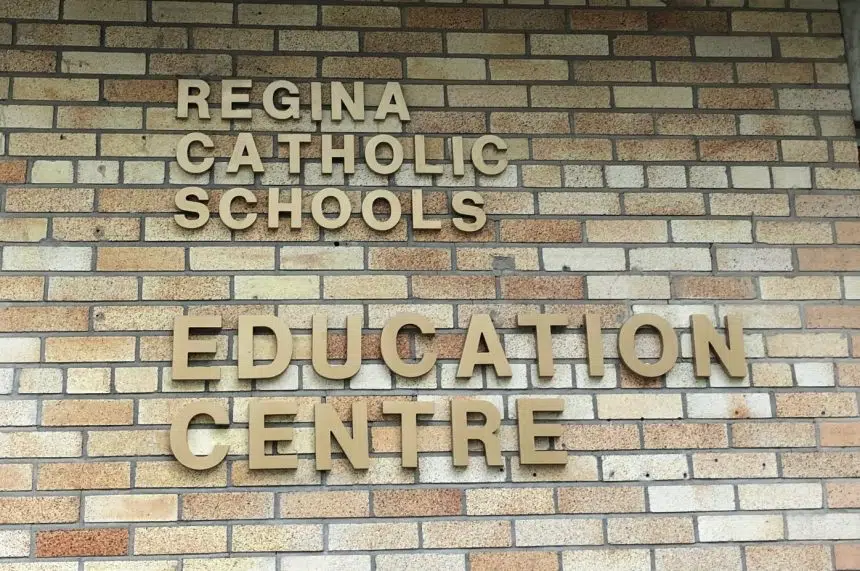Families with kids who attend most of the Catholic elementary schools in Regina will be paying a lunchroom supervision fee in the next school year.
In an email sent to families Thursday, the division said the cost for a full-time student in grades 1 through 8 is $70 per year, while the fee for kids in kindergarten will be $35 per year.
Families with more than two students in an elementary school won’t pay more than $140.
Seven schools that use an adjusted school day with a 30-minute lunchbreak — Holy Rosary, Sacred Heart, St. Augustine, St. Francis, St. Michael, St. Maria Faustina and St. Luke — are exempt from the fee.
“Charging lunchtime fees will recover the cost of providing supervision by staff,” the division said in the email. “Regina Public Schools charges a similar fee, and other urban school divisions in Saskatchewan will implement lunchroom supervision fees in September 2022.”
Vicky Bonnell, the chair of the Catholic school division’s board, said the decision was made after consulting with other school divisions.
“We checked with other school boards to see if they had anything similar along these lines,” Bonnell said. “I know that Saskatoon school boards are implementing a fee for supervision during lunch as well and I understand that Regina Public has done it for the last few years.
“We want to keep as many resources as possible in the classroom.”
The division said it expected the initiative to generate $300,000 annually.
Asked if the fee would be a permanent measure to make up lost costs, Bonnell says it could be re-evaluated in the future.
“With every kind of decision that we make, it’s up for review as for the end of the year,” she said. “But at the same time, recognizing that we do pay for lunchtime supervision to our staff, this is just cost recovery for that decision.”
The fee will be charged for all students who stay at school over the noon hour, and is to be paid in full at the start of the school year. However, the division said there will be an option to split the fee, with payments in September and February.
The division admitted there could be some exceptions to the payments.
“We recognize some families are not able to pay,” the email read. “We understand. We will not ask schools to follow up for unpaid fees.”
Parents react
Not surprisingly, the reaction to the division’s decision wasn’t favourable.
“Where does it end? Next are we going to have fees for recess? The price of gas (and) cost of food (is going up),” said Shawn Bellefeuille, a parent of several children who attend a Catholic school in Regina.
“I live on a disability cheque and my income doesn’t go up. I don’t get an increase on my disability (cheque). It’s just more stress added to the pocketbook and it just seems it doesn’t end,” he added.
One women thought it was bizarre to implement the fee during such difficult times.
“I think it’s ridiculous,” she said. “It’s very expensive. It’s really hard on a single mother and I can’t afford it, I know that.”
Another parent also thought the fee was unfair.
“I was quite surprised that we’re going to have to pay some fees,” a woman said. “I don’t think it’s right at all. The cost of living is rising every day, basically, and this just adds to the burden.”
A man who was picking up his little brother from school was wondering why a fee is even needed.
“I feel like this is overpriced and there is nothing they’re giving that is different than any other school,” he said. “For high school, it is completely free. I don’t understand why they’re willing to charge $140 just to supervise when they were doing this prior beforehand as well.”
Duncan comments
Education Minister Dustin Duncan wasn’t made available to comment on the issue, but did send a statement.
“Currently, school divisions across the province are working on their budgets to have them submitted to the Ministry of Education by the June 30th deadline,” he wrote. “I appreciate all of the effort that goes into preparing school division budgets.
“This is only the first step of the process. Once budgets are submitted, they are reviewed by the Ministry of Education and myself. I look forward to working with divisions in the coming weeks to ensure the needs of their students are met. As formal proposals are still being submitted, any further comment prior to discussion with the boards would be speculative.”
Duncan has said previously when asked about shortfalls in budgets that divisions may have to dip into reserves. He said there is about $400 million in reserve funding for the 27 divisions in the province, including about $140 million of unrestricted reserves.











